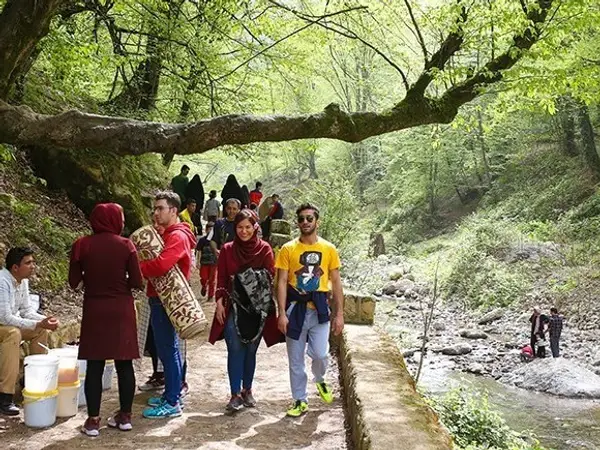Iran’s morality police arrested 120 people in a nature tour in the forests of the Caspian Sea area for flouting their hijab, dancing together, and drinking alcohol.
The head of the Justice Department of Mazandaran Province, Mohammad-Sadegh Akbari, said Sunday participants in the tour had “committed criminal activities".
These, Akbari said, included unrelated men and women mingling and dancing together, drinking, and women flouting their hijab. He said the case has been referred to relevant judicial authorities for prosecution.
Young men and women, and even groups of families, often book nature tours together to remote areas such as forests, mountains, and deserts to socialize and party in a more relaxed setting than urban public and private venues. Mixed parties with music, dance, and alcohol are banned and often raided by the morality police. Participants in such parties can be arrested even within the confines of their private homes.
Such events very rarely involve any crimes other than merrymaking, but nevertheless, authorities in charge of watching people's abidance by the state-sanctioned Islamic norms and regulations consider them as defiance and often crack down when tipped off. Being caught at mixed parties, particularly where alcohol is served, may entail legal punishments including prison, lashes, and cash fines.
Many branches of Islamic mysticism are considered as heretical sects in the Islamic Republic and their followers sometimes resort to booking nature tours in remote areas as a means of congregation. Last September police arrested 27 women and 52 men for holding a congregation, as a “false mystic sect” in a remote forested area of Gilan.
Group arrests of participants in nature tours is not unprecedented. In the past few years several groups of nature tourists have been arrested in the deserts and mountains for flouting Islamic morality rules.
The head of Mazandaran Justice Department also accused the participants in the recent forest tour of putting up "devil-worship banners" in their forest gathering. Devil-worship, in Iranian authorities' jargon, often refers to heavy metal or hard rock music and fashion associated with them, including body art, rather than the cult of the devil.
In December 2019, morality police arrested 135 young men and women at a party in an industrial shed near Tehran and branded them as "devil-worshippers".
Iranian authorities often invite foreign tourists to the country promising them safety and security if “they abide by the country’s rules”, including wearing the hijab for women and abstaining from alcohol.
The restrictions imposed on foreign tourists have deprived the country of huge revenues. The Russian ambassador to Tehran, Levan Dzhagaryan (Jagaryan), recently said in an interview that Iran could not be a popular destination for Russian tourists due to its dress code and ban on alcohol. Dzhagaryan’s remarks hugely displeased hardliners who accused him of being insensitive and disrespectful.
In recent weeks promotion of Iran’s tourist attractions by young social media influencer Hoda Rostami, particularly on her Instagram page which has over 450k followers, has stirred a huge controversy in Persian social media. Rostami took a ‘fam trip’ to Iran and published her own or other female tourists' images next to mosques, ancient relics and even the notorious Evin prison on social media.
Many netzines accuse Rostami of trying to whitewash the realities of living in Iran including many social and political restrictions imposed on Iranians, including the hijab, to encourage foreigners to visit the country. Rostami admitted, after being criticized that she had meetings with state officials at ministerial level to facilitate the fam trips.
